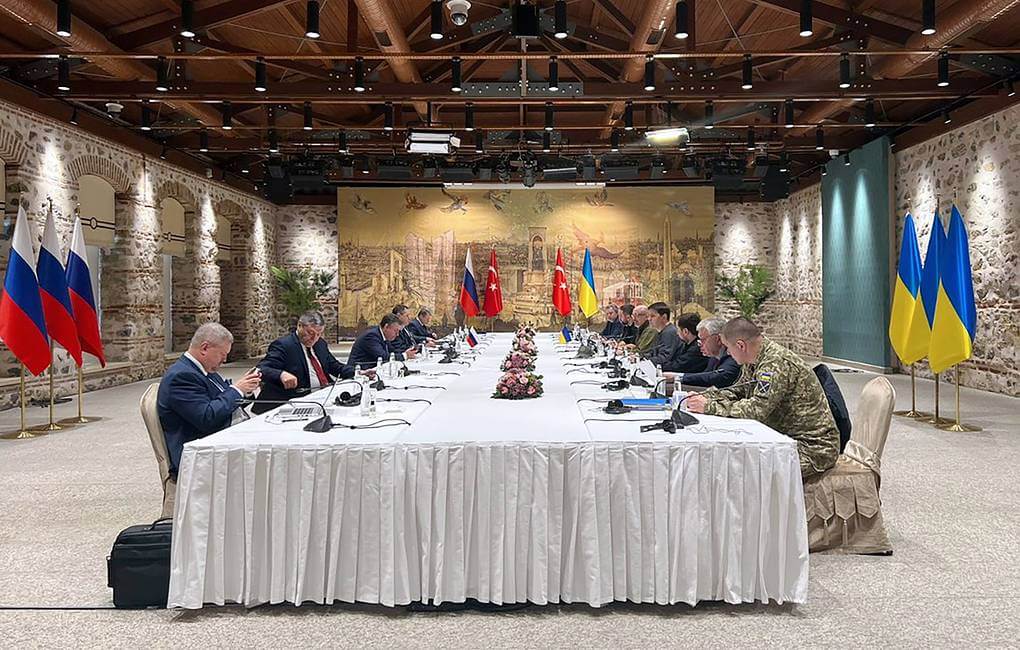On Tuesday, following the latest round of Russia-Ukraine peace talks in Turkey, Russian negotiators promised to de-escalate the situation in Ukraine and even expressed readiness to hold a meeting between Vladimir Putin and Volodymyr Zelensky.
After almost four hours of discussions, the head of the Russian delegation, Vladimir Medinsky, told reporters that the talks were productive and that Moscow had received a “clearly phrased position” from Kyiv. He affirmed that Moscow plans to provide a reciprocal proposal after studying Ukraine’s draft bilateral treaty given in Turkey. “Now we understand how to move towards a compromise,” Medinsky added, underscoring that the Ukrainian proposals are a “step to meet us halfway, a clearly positive fact.”
Unconditional security guarantees for Ukraine, ceasefire, effective decisions on humanitarian corridors and humanitarian convoys, observance by the parties of the rules and customs of war. Difficult negotiations for peace in our country. Istanbul round right now… pic.twitter.com/SUTAQrAhA2
— Михайло Подоляк (@Podolyak_M) March 29, 2022
In this context, Medinsky mentioned that Russia is open to holding a meeting between Putin and Zelensky to officially sign a peace treaty. However, the Russian official cautioned that a “long way will have to be walked to draft such a treaty on mutually acceptable conditions.”
Ukraine, for its part, has demanded legally binding security guarantees from various countries, including the permanent five members of the United Nations (UN) Security Council—the United States (US), Britain, China, Russia, and France. Ukrainian officials also noted prominent members of the North Atlantic Treaty Organization (NATO)—Turkey, Germany, Canada, Italy, and Poland—under its list of proposed guarantors.
David Arakhamia, the leader of Ukraine’s ruling party and one of the chief negotiators in Turkey, told reporters: “We want an international mechanism of security guarantees where guarantor countries will act in a similar way to NATO’s article number five — and even more firmly.”
Over the last days, the Russian ruble has APPRECIATED against the Dollar and is now back below 100 - for the first time since Russia started the invasion in Ukraine. FX flows continue via energy exports, and the central bank's measures prove effective in stabilising currency. pic.twitter.com/SnfIXQsERH
— Philipp Heimberger (@heimbergecon) March 25, 2022
Separately, President Zelensky confirmed that Italy has already agreed to become one of the guarantors, adding that he will continue his diplomatic efforts to rally support for the international security mechanism.
The Ukrainian delegation made it clear that it would only accept two of Russia’s demands—regarding Ukraine’s neutral status and prohibition from joining any alliance. A Ukrainian negotiator, Oleksandr Chaly, affirmed that Ukraine will not join “any military-political alliance” or house foreign military bases in an effort to end the ongoing war.
In exchange, they stressed that these guarantees should help Ukraine attain full membership in the European Union (EU). Ukraine also called on the guarantor countries to provide funds for Ukraine’s accession to the EU.
As for Crimea, it is offered to clearly record the parties' intention to settle the issue exclusively through 🇺🇦-🇷🇺 bilateral negotiations within 15 years. It's also offered not to resolve the Crimean issue by military means in any case. Only political & diplomatic efforts.
— Михайло Подоляк (@Podolyak_M) March 29, 2022
According to Ukrainian Presidential advisor Mykhailo Podolyak, the final approval of the aforementioned security guarantees is subject to a nationwide referendum, which can only be held once all of Russia’s troops have been withdrawn from Ukraine.
On the topic of Crimea, which was annexed by Russia in 2014, Podolyak noted that Kyiv has proposed to hold negotiations with Russia within the next 15 years, adding that the status of Russia-backed separatist territories in Donbas will be addressed at the prospective Putin-Zelensky meeting.
Meanwhile, the Russian ruble rallied by 10% following the latest round of peace talks between the warring neighbours. The Russian Central Bank also launched stringent rules barring companies from sending foreign currency out of the country and forbade citizens from buying it in cash to help strengthen the ruble further.

